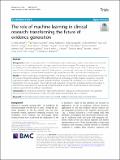The role of machine learning in clinical research: transforming the future of evidence generation
Author(s)
Weissler, E. H.; Naumann, Tristan; Andersson, Tomas; Ranganath, Rajesh; Elemento, Olivier; Luo, Yuan; Freitag, Daniel F.; Benoit, James; Hughes, Michael C.; Khan, Faisal; Slater, Paul; Shameer, Khader; Roe, Matthew; Hutchison, Emmette; Kollins, Scott H.; Broedl, Uli; ... Show more Show less
Download13063_2021_Article_5489.pdf (1003.Kb)
Publisher with Creative Commons License
Publisher with Creative Commons License
Creative Commons Attribution
Terms of use
Metadata
Show full item recordAbstract
Abstract
Background
Interest in the application of machine learning (ML) to the design, conduct, and analysis of clinical trials has grown, but the evidence base for such applications has not been surveyed. This manuscript reviews the proceedings of a multi-stakeholder conference to discuss the current and future state of ML for clinical research. Key areas of clinical trial methodology in which ML holds particular promise and priority areas for further investigation are presented alongside a narrative review of evidence supporting the use of ML across the clinical trial spectrum.
Results
Conference attendees included stakeholders, such as biomedical and ML researchers, representatives from the US Food and Drug Administration (FDA), artificial intelligence technology and data analytics companies, non-profit organizations, patient advocacy groups, and pharmaceutical companies. ML contributions to clinical research were highlighted in the pre-trial phase, cohort selection and participant management, and data collection and analysis. A particular focus was paid to the operational and philosophical barriers to ML in clinical research. Peer-reviewed evidence was noted to be lacking in several areas.
Conclusions
ML holds great promise for improving the efficiency and quality of clinical research, but substantial barriers remain, the surmounting of which will require addressing significant gaps in evidence.
Date issued
2021-08-16Department
Massachusetts Institute of Technology. Department of Electrical Engineering and Computer Science; Massachusetts Institute of Technology. Institute for Medical Engineering & SciencePublisher
BioMed Central
Citation
Trials. 2021 Aug 16;22(1):537
Version: Final published version